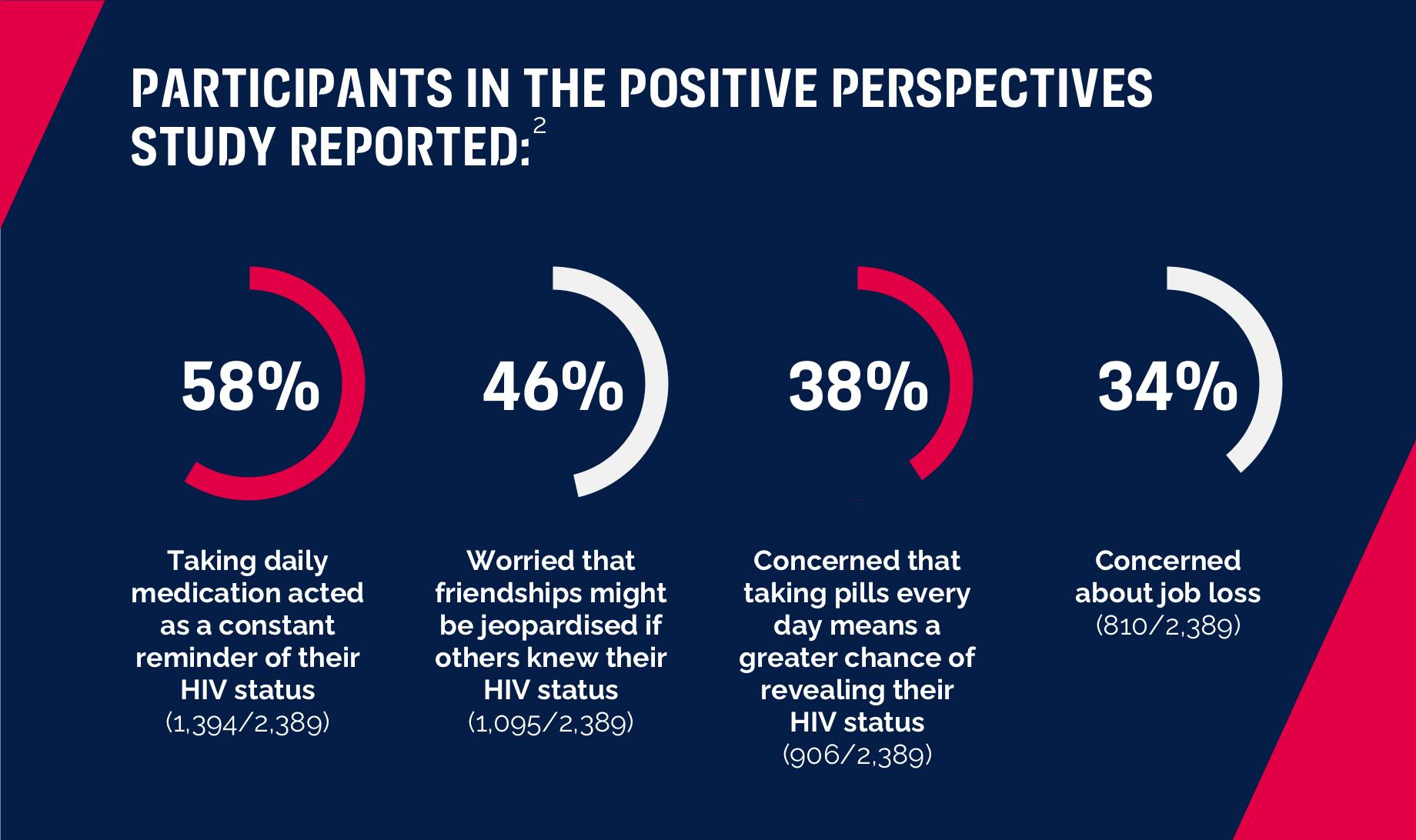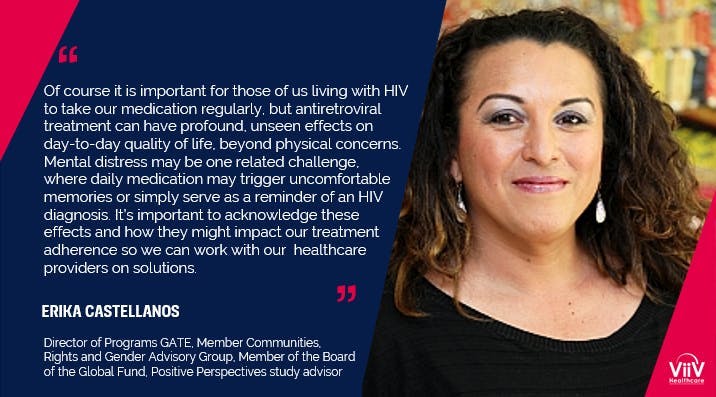HIV DAILY MEDICATION CHALLENGES FACED BY SOME PLHIV

Data from the global Positive Perspectives study highlight the unseen self-reported psychosocial impact that daily medication may have on some people living with HIV and what innovations in treatment might mean for quality of life.
Since the emergence of antiretroviral therapies, these innovative HIV treatments have had a significant impact on those within the HIV community with access to them. As HIV medications continue to progress and advance there is still more to be done around framing health-related quality of life beyond the “absence of disease or infirmity”, as defined by the World Health Organization.1
Results from the Positive Perspectives study, published in AIDS and Behaviour, highlight the physical, emotional and psychosocial challenges related to daily oral ART that some people living with HIV reported. The challenges noted in the study included side effects, pill fatigue, cueing of negative emotions and HIV status stigma.2
Some Positive Perspectives study participants also reported low treatment satisfaction, virologic failure and sub-optimal overall health. Authors of the study suggested that psychosocial challenges may impact health outcomes.2 In fact, study participants who reported stress or anxiety related to taking HIV medication every day were over three times more likely to report a poorer outlook in relation to their HIV-related mortality* compared to those who did not report this stress or anxiety.2
For some study participants, concerns about telling others about their HIV have manifested as actively hiding their status. The study found that 58% (1,383/2,389) of participants reported disguising or hiding their HIV medication in order to avoid sharing their status, while 29% (693/2,389) reported missing doses at least once within the past 30 days because they “were not in a situation where they felt comfortable taking their pills”.
Such behaviours have been found to have an inverse association with self-reported optimal overall health. Another study found that disguising or hiding HIV medication was associated with poor outlook towards HIV-related mortality.3 These results, along with the Positive Perspectives data, underscore the pressing need for innovation and alternatives in HIV therapy to help people living with HIV rise above the self-reported barriers that could be impacting health outcomes.


"Of course it is important for those of us living with HIV to take our medication regularly, but antiretroviral treatment can have profound unseen effects on day-to-day quality of life, beyond physical concerns. Mental distress may be one related challenge. where daily medication may trigger uncomfortable memories or simply serve as a reminder of an HIV diagnosis. It's important to acknowledge these effects and how they might impact our treatment adherence so we can work with our healthcare providers on solutions."

References:
- World Health Organization (WHO). (2020). Who we are. Constitution. Available at: https://www.who.int/about/who-we-are/constitution. Last accessed: January 2021
- de los Rios, P., Okoli, C., Castellanos, E. et al. (2020) Physical, Emotional, and Psychosocial Challenges Associated with Daily Dosing of HIV Medications and Their Impact on Indicators of Quality of Life: Findings from the Positive Perspectives Study. AIDS Behav. https://doi.org/10.1007/s10461-020-03055-1
- Clark, L., Karki, C., Noone, J., Scherzer, J., Bode, M., Rizzini, P., Van de Velde, N. (2020). Quantifying people living with HIV who would benefit from an alternative to daily oral therapy: Perspectives from HIV physicians and people living with HIV. Population Medicine, 2 (October), 33. https://doi.org/10.18332/popmed/126632
The Positive Perspectives study is one of the largest, global, HIV patient-reported outcomes (PROs) studies to date, with 2,389 people living with HIV participating from 25 countries. Participants were asked to rate their own health, how living with HIV impacts their lives and affects their outlook for the future, as well as examining their interactions and relationships with HCPs and their experiences with ART. All findings are self-reported.
YOU MAY ALSO BE INTERESTED IN:
Find out more about how taking multiple medications can affect quality of life for people living with HIV. Data from Positive Perspectives study (Wave 2).
Positive Perspectives study results indicate that many people living with HIV still aspire to treatments that have even less impact on quality of life.
Global Positive Perspectives data demonstrate a strong link between high reported engagement with healthcare providers (HCPs) and positive self-reported health outcomes for people living with HIV, yet study results also show many do not feel comfortable raising important treatment issues.
If you get any side effects, talk to your doctor, pharmacist, or nurse. This includes any possible side effects not listed in the package leaflet. You can also report side effects directly via the GSK Reporting Tool link https://gsk.public.reportum.com/. By reporting side effects, you can help provide more information on the safety of this medicine.
If you are from outside the UK, you can report adverse events to GSK/ ViiV by selecting your region and market, here.



